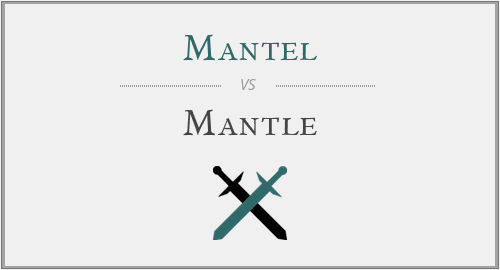Mantel” and “mantle” are often confused in English due to their spellings, which are obviously very similar. Either the way they are pronounced, or the way many autocorrect programs work, are often creating grammatical errors by replacing one word with the other and creating the illusion that they are one and the same.
What is a “mantel”? What does a “mantle” mean? Is there any lexical difference between them? If yes, how do we distinguish these two words and avoid future confusions? We’ll answer all these questions in a minute, so keep reading this article to find out!
Mantel vs. Mantle
Let’s take a closer look to these words and compare them a little. Both “mantel” and “mantle” are nouns and they both look almost the same. Nothing seems to indicate any major difference so far, does it? Well, no, but if we take a short look to the origin of these words, thing will significantly simplify.
“Mantle”, on one hand, is a simple, modern word from the fashion niche. But we can’t say the same about “mantel”. “Mantel”, on the other hand, is actually the short word for “mantelpiece”. In fact, in UK English, they only use the word in this form. “Mantel” is a word mostly used in US English, as a shorter and more comfortable word for “mantelpiece”. Remembering this provenience of words is certainly the best way to distinguish them correctly.
When do we use “mantel”?
“Mantel” is mostly used in Australian or America English, rather than in British English, so that’s where we recommend that you use this word spelled in its short form. If you are having a conversation in UK English, then “mantelpiece” will be more appropriate. Otherwise, both words are nouns defining the shelf placed above a fireplace.
Example: They kept their family album, money and some books on the mantel. – “mantel” is the US synonym for the UK “mantelpiece”, the shelf above a fireplace.
When do we use “mantle”?
“Mantle”, on the other hand, is used in every English-speaking area, as a modern noun referring to a long piece of clothing, usually worn to show a statute, whether it’s by a priest, a king or a superhero. Some perfect synonyms for “mantle” would be “cloak”, “cape” or “pelerine”.
Example: The queen wore a silk mantle over her expensive dress. – “mantle” is a perfect synonym for “pelerine” or “cloak”.
Conclusion “Mantel” and “mantle” might be pronounced and written very similarly, but don’t get tricked by their spelling similitude. The words have completely different meanings: a “mantel” is the shelf above a fireplace, and a “mantle” is an elegant piece of clothing, a “cloak”. Remember these definitions to make sure you use them correctly.





Have a discussion about this article with the community:
Report Comment
We're doing our best to make sure our content is useful, accurate and safe.
If by any chance you spot an inappropriate comment while navigating through our website please use this form to let us know, and we'll take care of it shortly.
Attachment
You need to be logged in to favorite.
Log In